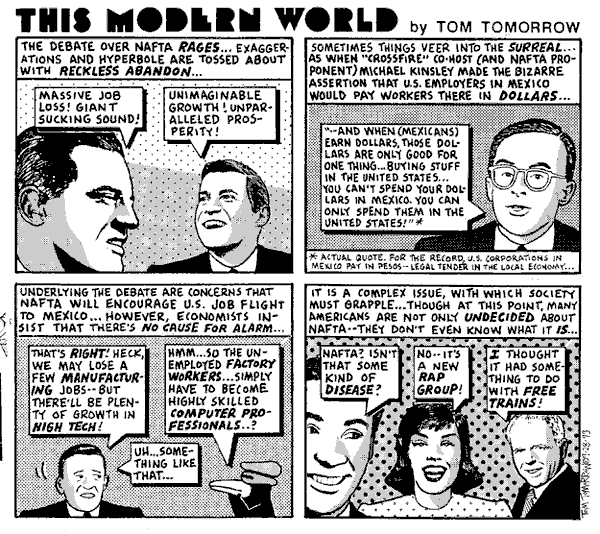Here's another one for the cross-cultural collaboration files:
A while back I quoted one of my professors on the evolution of US foreign policy -- essentially saying that Theodore Roosevelt and Woodrow Wilson laid the foundation on which subsequent presidents built. We've covered a lot of ground over the past few weeks, most of which was covered in a harrowing midterm that spanned two centuries of foreign policy from seven different countries, and now we're focusing on major international issues. This week: globalization.
Among our readings, Prof. Pastor has included one of his own pieces, a 2008 article for Foreign Affairs. In it, Pastor addresses a few assumptions about U.S. security and economy and argues that Mexico and Canada have a greater impact on both than any other country. Casting aspersions on NAFTA and immigration (both popular whipping boys during campaign season) does little to improve goodwill in the neighborhood. Pastor advocates for tripartite dialogue, conducted on equal footing (or as equal as possible) between Canada, Mexico and the United States to create "a sense of community and a common approach to continental problems."
Hard power standards like economic collaboration, customs unions, and an investment fund to reduce the income gap between Mexico and its neighbors are part of this strategy. But it also relies on soft power as well, namely in the form of generating goodwill and a Donnesque spirit of common purpose: "A North American approach needs a vision based on the simple premise that each country benefits from its neighbors' success and each is diminished by their problems or setbacks."
It's like that scene in A Beautiful Mind where Russell Crowe deduces that he and his buddies are going to have to collaborate if they want to get lucky, because blind pursuit of personal interests will inevitably lead to going home alone--only slightly less crass and significantly more international. The proposal involves moving away from bureaucratic haggling and towards collaborative solutions. One suggestion involves sponsoring centers for North American studies in each country, to promote regional solidarity. Ultimately, it relies on the assumption that by working together, we stop being part of the problem and start contributing to the solution.

No comments:
Post a Comment